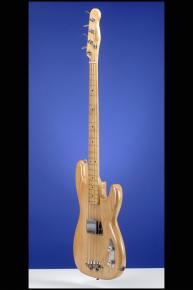"The Wolf and the Mole" A Historic '51 Precision Bass
This super lightweight Precision Bass weighs just 7.30 lbs. and has a nut width of just under 1 3/4 inches and a full bass scale length of 34 inches. Solid ash body, contoured on back and lower bass bout, one-piece maple neck with a medium to thick profile, and maple fretboard with 20 frets and black dot position markers. Individual Kluson bass tuners with cloverleaf metal buttons. Narrow headstock with decal with Fender "spaghetti" logo in gold with black trim and "Custom Bass" in black below it. Four-bolt neck plate. The neck is dated in pencil: "TG 11-21-51" (Tadeo Gomez November 21, 1951) and has a "D" stamped in blind. The bottom of the neck is stamped in blind: "R & R 3228." The neck pocket is dated in pencil: "-- -- 51" and has "R & R 3228" stamped in blue. One black-bottom four-polepiece P-Bass pickup with chrome cover and an output of 7.81k. No pickguard. Two controls (one volume, one tone) on lower treble bout. Original "tall" domed top knobs with knurled sides. Two original "pressed fiber" saddles with bridge plate tailpiece with serial number ("0241") "stamped on." The original "Butterscotch" finish was removed long ago and the body re-finished in Natural. At the same time, the bass edge of the body was "contoured" for a more comfortable feel -- as on Precision Basses from 1954 onward.
It has been looked after extremely well -- and is in excellent (8.50) condition, with only a few marks on the top and edges. The word "spectacular" is a poor adjective with which to describe the sound of this bass -- especially at the the low end -- a true monster grunt! Housed in a later (seventies) black Fender hardshell case with dark orange plush lining (9.00). Overall, an exceptional example of one of the earliest Precision Basses and a famous piece of Rock'n'Roll memorabilia to boot:
This very early Precision Bass was owned and played by Larry "The Mole" Taylor of Canned Heat.
"Emerging in 1966, Canned Heat was founded by blues historians and record collectors Alan 'Blind Owl' Wilson and Bob 'The Bear' Hite. They gained international attention and secured their niche in the pages of rock 'n roll history with their performances at the 1967 Monterey Pop Festival (along with Jimi Hendrix, Janis Joplin and The Who) and the headlining slot at the original Woodstock Festival. Wilson was already renowned for his distinctive harmonica work when he accompanied veteran bluesman, Son House, on his rediscovery album, 'Father of the Blues.' Hite took the name Canned Heat from a 1928 recording by Tommy Johnson. They were joined by Henry 'The Sunflower' Vestine, another ardent record collector capable of fretboard fireworks at a moment's notice who was a former member of Frank Zappa's Mothers of Invention. Rounding out the band in 1967 were Larry 'The Mole' Taylor on bass, an experienced session musician who had played with Jerry Lee Lewis and The Monkees and Adolfo 'Fito' de la Parra on drums who had played in two of the biggest Latin American bands, Los Sinners and Los Hooligans and then with The Platters, The Shirelles, T-Bone Walker and Etta James…Right from the start, Canned Heat has been at the forefront of popularizing blues music. Their second album, 'Boogie With Canned Heat,' included the worldwide hit 'On The Road Again' and a twelve minute version of 'Fried Hockey Boogie' that established them with hippie ballroom audiences as the 'kings of the boogie!' Their third album, 'Living The Blues,' included a 19-minute tour de force, 'Parthenogenesis' which displayed the quintet at their most experimental along with their incarnation of Henry Thomas' 'Bulldozer Blues' where singer, Wilson, retained the tune of the original song, rewrote the lyric and came up with 'Goin' Up The Country,' whose simple message caught the 'back-to-nature' attitude of the late '60s and went to #1 in 25 countries around the world" (www.cannedheatmusic.com).
In an exclusive interview with us, Larry said that he bought this P-Bass in 1968 from Mabron "The Wolf" McKinney, who at the time played this bass with Duane and Greg Allman when they were recording as Hour Glass, 1967-1968. "I kept it for about 10 years," Larry told us, "then I sold it to a friend named Jay Jones; he was a guitar and bass collector that lived in Southern Calif and then moved to Northern Calif in the 80s." Larry has lately been touring with Tom Waits, and as of this writing (11/07) "I will be doing a sound track for a new movie [from] Sony Pictures about the relationship between Muddy Waters and Leonard Chess called Cadillac Blues starting in NY in December."
Thus, this very special P-Bass - which, in homage to its previous owners, we've christened "The Wolf and The Mole" (it growls and digs deep in the groove!) - was used during the Allman brothers' earliest recording incarnation as Hour Glass for Liberty Records and through Canned Heat's most productive and hit-making period. As such, this P-Bass is closely associated with two of rock music's pioneering bands during the classic era of the late 1960s. This ax has seen a lot; music history is written all over it. Sometimes you wish guitars could talk as well as sing.
The Precision Bass, with its revolutionary new shape, was launched in 1951, and originally had a slab body. It was not until 1954, with the introduction of the Stratocaster, that Fender contoured the body. All early Precision Basses had one-piece maple necks, but in 1959, a slab-board rosewood fretboard was introduced, and then finally in 1962 the "veneer" rosewood fretboard was introduced.
Until the Precision, the bass was an upright acoustic instrument that was difficult to hear and cumbersome to transport. Leo Fender's invention allowed musicians to hold their instrument like a guitar, opening the bass world to curious guitar players, and allowing bass players a level of freedom they had not yet encountered. Due to the bass's solid body construction, it could be amplified to any level, giving it new found aural presence. In its first fifteen years of development, the Precision Bass changed as much as the music it influenced and the musicians it inspired, having been played by everyone from The Shadows to Led Zeppelin.
Translate:








